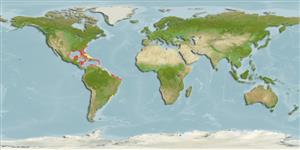Demospongiae |
Tetractinellida |
Tetillidae
Environment: milieu / climate zone / djupintervall / distribution range
Ekologi
; djupintervall 3 - 80 m (Ref. 108813). Tropical
Atlantic Ocean.
Length at first maturity / Size / Weight / Age
Könsmognad: Lm ? range ? - ? cm Max length : 10.0 cm WD hane/ej könsbestämd; (Ref. 415)
Globular up to 10 cm wide, pockmarked or pitted with blind concave depressions (porocalices): 0.3 - 1.5 cm wide; oscules 0.1 - 0.5 cm wide sometimes visible on the top of the sponge. Orange to yellow externally, lighter internally (Ref. 415). May also be hemispheric in high-energy environments, and pear-shaped in quiet water with high sedimentation. Specimens larger than 8 cm may be massive and cake-shaped. Very firm consistency (Ref. 85482).
Known from depths between 3 to 80 m (Ref. 85482).
Life cycle and mating behavior
Könsmognad | Reproduktion | Lek | Eggs | Fecundity | Larvae
Members of the class Demospongiae are hermaphroditic. Life cycle: The zygote develops into parenchymella larva (free-swimming) before settling down on a substrate where it grows into a young sponge.
Collin, R., M.C. Díaz, J. Norenburg, R.M. Rocha, J.A. Sánchez, M. Schulze, A. Schwartz and A. Valdés 2005 Photographic identification guide to some common marine invertebrates of Bocas Del Toro, Panama. Caribbean Journal of Science. 41(3):638-707. (Ref. 415)
IUCN Red List Status
(Ref. 130435: Version 2025-1)
CITES status (Ref. 108899)
Not Evaluated
Not Evaluated
Threat to humans
Harmless
Human uses
| FishSource |
Verktyg
Ytterligare information
Trophic EcologyFood items (preys)
Födosammansättning
Födointag
Predatorer
Population dynamicsTillväxt
Max. ages / sizes
Length-weight rel.
Length-length rel.
Length-frequencies
Mass conversion
Abundans
PhysiologySyreförbrukning
Human RelatedStamps, coins, misc.
Internet-källor
Estimates based on models
Preferred temperature
(Ref.
115969): 22.9 - 28, mean 25.9 (based on 274 cells).
Fishing Vulnerability
Low vulnerability (10 of 100).
Price category
Unknown.
